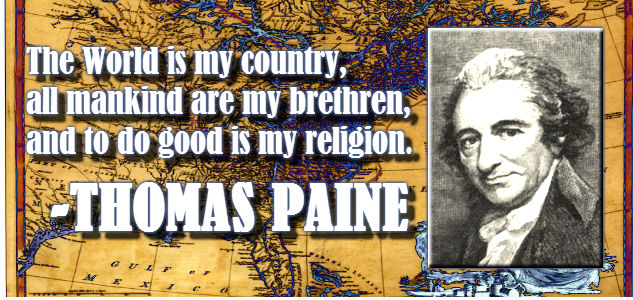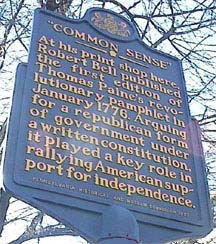
On Thomas Paine’s birthday it is important to remember the man who was a central character in the British, American and French democracy movements.
Celebrating Thomas Paine’s Birthday!
January 29, 1737 is Thomas Paine’s birthday and it is a good deed to remember his life and work. He was a British man who was a central character in the American and French Revolutions on the side of democracy and human rights. He supported both Native Americans and African slaves in a time where this was heresy. Perhaps, his most important contribution to modern democracy is the words he wrote to inspire America to revolution for the sake of representative government in January of 1776:
SOME writers have so confounded society with government, as to leave little or no distinction between them; whereas they are not only different, but have different origins. Society is produced by our wants, and government by our wickedness; the former promotes our happiness POSITIVELY by uniting our affections, the latter NEGATIVELY by restraining our vices. The one encourages intercourse, the other creates distinctions. The first is a patron, the last a punisher.
Society in every state is a blessing, but Government, even in its best state, is but a necessary evil; in its worst state an intolerable one: for when we suffer, or are exposed to the same miseries BY A GOVERNMENT, which we might expect in a country WITHOUT GOVERNMENT, our calamity is heightened by reflecting that we furnish the means by which we suffer. Government, like dress, is the badge of lost innocence; the palaces of kings are built upon the ruins of the bowers of paradise. For were the impulses of conscience clear, uniform and irresistibly obeyed, man would need no other lawgiver; but that not being the case, he finds it necessary to surrender up a part of his property to furnish means for the protection of the rest; and this he is induced to do by the same prudence which in every other case advises him, out of two evils to choose the least. Wherefore, security being the true design and end of government, it unanswerably follows that whatever form thereof appears most likely to ensure it to us, with the least expense and greatest benefit, is preferable to all others.
The Thomas Paine National Historical Society is an interesting American place of study about Paine. The writer and orator Robert G. Ingersoll wrote of Paine’s last days:
Thomas Paine had passed the legendary limit of life. One by one most of his old friends and acquaintances had deserted him. Maligned on every side, execrated, shunned and abhorred – his virtues denounced as vices – his services forgotten – his character blackened, he preserved the poise and balance of his soul. He was a victim of the people, but his convictions remained unshaken. He was still a soldier in the army of freedom, and still tried to enlighten and civilize those who were impatiently waiting for his death. Even those who loved their enemies hated him, their friend – the friend of the whole world – with all their hearts. On the 8th of June, 1809, death came – Death, almost his only friend. At his funeral no pomp, no pageantry, no civic procession, no military display. In a carriage, a woman and her son who had lived on the bounty of the dead – on horseback, a Quaker, the humanity of whose heart dominated the creed of his head – and, following on foot, two negroes filled with gratitude – constituted the funeral cortege of Thomas Paine
From the US history government website:
“These are the times that try men’s souls.”This simple quotation from Founding Father Thomas Paine’s The American Crisis not only describes the beginnings of the American Revolution, but also the life of Paine himself. Throughout most of his life, his writings inspired passion, but also brought him great criticism. He communicated the ideas of the Revolution to common farmers as easily as to intellectuals, creating prose that stirred the hearts of the fledgling United States. He had a grand vision for society: he was staunchly anti-slavery, and he was one of the first to advocate a world peace organization and social security for the poor and elderly. But his radical views on religion would destroy his success, and by the end of his life, only a handful of people attended his funeral.
Brief Biography on Thomas Paine’s Birthday 2014
On January 29, 1737, Thomas Paine was born in Thetford, England. His father, a corseter, had grand visions for his son, but by the age of 12, Thomas had failed out of school. The young Paine began apprenticing for his father, but again, he failed. So, now age 19, Paine went to sea. This adventure didn’t last too long, and by 1768 he found himself as an excise (tax) officer in England. Thomas didn’t exactly excel at the role, getting discharged from his post twice in four years, but as an inkling of what was to come, he published “The Case of the Officers of Excise” (1772), arguing for a pay raise for officers. In 1774, by happenstance, he met Benjamin Franklin in London, who helped him emigrate to Philadelphia.

His career turned to journalism while in Philadelphia, and suddenly, Thomas Paine became very important. In 1776, he published “Common Sense”, a strong defense of American Independence from England. He traveled with the Continental Army and wasn’t a success as a soldier, but he produced “The American Crisis” (1776-83), which helped inspire the Army. This pamphlet was so popular that as a percentage of the population, it was read by or read to more people than today watch the Super Bowl.
But, instead of continuing to help the Revolutionary cause, he returned to Europe and pursued other ventures, including working on a smokeless candle and an iron bridge. In 1791-92, he wrote “The Rights of Man” in response to criticism of the French Revolution. This work caused Paine to be labeled an outlaw in England for his anti-monarchist views. He would have been arrested, but he fled for France to join the National Convention.
By 1793, he was imprisoned in France for not endorsing the execution of Louis XVI. During his imprisonment, he wrote and distributed the first part of what was to become his most famous work at the time, the anti-church text, “The Age of Reason” (1794-96). He was freed in 1794 (narrowly escaping execution) thanks to the efforts of James Monroe, then U.S. Minister to France. Paine remained in France until 1802 when he returned to America on an invitation from Thomas Jefferson. Paine discovered that his contributions to the American Revolution had been all but eradicated due to his religious views. Derided by the public and abandoned by his friends, he died on June 8, 1809 at the age of 72 in New York City
Choose a Work to Read for Thomas Paine’s Birthday!
- Common Sense (1776)
- The American Crisis (1776-77)
- The Rights of Man (1791-92)
- Age of Reason (1794, 1795, 1807)
Leave a Reply